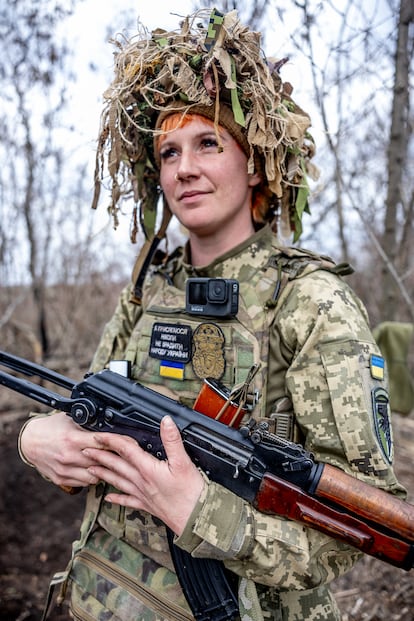A Canadian combat medic in Ukraine: ‘I looked at my children and thought I had to do something’
April Huggett traded her life as a homemaker in Canada for the trenches of Ukraine to defend democracy and freedom against Russia’s expansionist ambitions


Until 2022, April Huggett’s life revolved around caring for her three children, then aged two, seven, and 11. The Russian invasion of Ukraine shook her so much that she decided to trade that life as a homemaker for the trenches and daily bombings on the Donetsk front, one of the most active of the war, to defend democracy and the free world where she was born against the expansionist threat of Russia. “After the Bucha massacre, it was really hard for me to move on. It was so similar to World War II... I looked at my children and thought I had to do something,” she recalls at the foot of a trench in a Donbas forest, where she is training with her comrades from the Alcatraz Battalion. Huggett, 36, wasn’t content with being a volunteer; she enlisted and, since December 2024, has served as a combat medic for this battalion, part of the 93rd Kholodny Yar Separate Mechanized Brigade and made up exclusively of ex-convicts who took up a government offer of sentence reductions to fight on the front lines. Huggett disinfects the finger of a recruit who has just cut himself on a tool and says: “These people are my family. They are my friends.”
Question. How did you get started in Ukraine?
Answer. I started as a volunteer. I have two foundations and I was dedicated to providing humanitarian aid and various children’s projects. I took school supplies to different areas of the front, where some distance learning was still being offered, and I did a lot of animal evacuations, water distribution... Eventually, I decided I wanted to enlist.
Q. Was it easy to join the Armed Forces of Ukraine as a foreigner?
A. I had a friend who was providing training for medics, so I applied. I knew the commander of the 93rd Brigade because I was helping them with one of my foundations, so I asked to join. I thought it was a really interesting battalion, and I knew I could help because I’m very active on social media. The 93rd Brigade has fought in some of the toughest battles, and with great victories come great losses; they need a lot of help. We’re an assault infantry battalion, which means we’re on foot. We don’t have tanks or mortars; these guys are ahead of heavy machinery and need all the support they can get.
Q. What are your responsibilities?
A. I take care of the soldiers’ health. When they arrive, I find out if they have any pre-existing conditions, allergies, hepatitis C, HIV... Many of them have health problems, and I have to give them medication. I also train with them and make sure they’re okay.
Q. How did you prepare to be able to perform your role?
A. In my civilian life, I’m a process operator, so I can work on hydroelectric dams, refineries, and so on. But here, I was inclined to train as a combat medic, and my entire training is about saving lives: stopping bleeding, treating respiratory crises... I’ve been learning as I go, and one of my comrades is a medic, and he teaches me a lot. We have learning tools, like dummy arms and things for suturing, but a lot of it is research. I’m not a certified doctor, but I’m acting like one. If they need something I can’t provide, they come to our medical station. I was also recently promoted to PR for the battalion. I’m in charge of creating all of the social media, messaging, and videos.
Q. It’s a lot of work…
A. It’s a lot, but these boys deserve it; they work very hard. Many of them go to the positions [on the front], and if they’re not there, they’re training six days a week. It doesn’t matter if you’ve been to the front 20 times; you come back and train. It’s exhausting; they have Sundays off to clean their weapons and wash clothes, but they work nonstop. And they don’t have the freedom that the others have because they’re prisoners on parole; they can’t go to the city or take a weekend off. When they come here, they commit to being here as long as they’re needed.
Q. Did your family support your decision to stay in Ukraine?
A. No, and it’s been hard. People don’t understand that I think differently. In North America, we’re very far from this, but I have a lot of ideas about what this war means for our future. So I know I have that at stake, I guess, my own future and my time with my children. But I really think it’s not just about Russia and Ukraine. Russia is also looking at other countries, so it’s very important that we take a stand here for the whole free world. We all talk about how our societies are built on freedom and democracy, and that there should be freedom for everyone. We should live by what we say.
Q. Is Western military aid noticeable?
A. Promises are very nice, but I’ve been to Siversk, where there is one artillery unit of ours against the Russians’ five. Then there is an announcement saying they’re going to send more artillery and the guys use all the reserves because they believe it. But it doesn’t come in six months, eight months... Everybody is giving Ukraine just enough to contain the Russians, but not enough to win. If we had the whole team committed, we could do something, but it’s very difficult to plan battles when you don’t know what you’re going to get. And maybe you think something is going to come, for example, from the United States, because they’ve committed a certain amount of aid, but then it gets cut off because a new president comes in and all the military planning for the next six months goes out the window. How do you do that? I feel completely let down.

Q. What do you need now?
A. If we were in a Canadian or American army, we’d all have night vision goggles. But we don’t get enough money even for that, let alone uniforms, boots, first aid kits, vehicles... Ninety percent of drones come from donations. We don’t have enough money, and all of these things are consumables. They get destroyed. People die. It’s horrible. I don’t know how many times I’ve collected first aid kits from wounded people and we don’t even have enough to buy a new one. So now you’re giving a guy a kit that’s stained with blood or ripped with a bullet hole. It’s not good for morale, but you keep going. Other soldiers are given uniforms that have sewn-up bullet holes in them. Isn’t that unbelievable?
Q. Do you think Russia will respect a ceasefire?
A. Absolutely not! This is the same country that signed the Budapest Memorandum [which includes security guarantees against threats to Ukraine’s territorial integrity] in 1994, which was supposed to protect Ukraine. And then they invaded. Not once, but twice. Just because they sign a piece of paper doesn’t mean anything; they’re just going to regroup. The only way to stop Russia is to make sure they no longer have the capability. That starts not just with a war effort, but with sanctions that remove them from global markets and any decision-making. They have to be destroyed economically and militarily. That country is unhinged, and people refuse to see it.
Sign up for our weekly newsletter to get more English-language news coverage from EL PAÍS USA Edition
Tu suscripción se está usando en otro dispositivo
¿Quieres añadir otro usuario a tu suscripción?
Si continúas leyendo en este dispositivo, no se podrá leer en el otro.
FlechaTu suscripción se está usando en otro dispositivo y solo puedes acceder a EL PAÍS desde un dispositivo a la vez.
Si quieres compartir tu cuenta, cambia tu suscripción a la modalidad Premium, así podrás añadir otro usuario. Cada uno accederá con su propia cuenta de email, lo que os permitirá personalizar vuestra experiencia en EL PAÍS.
¿Tienes una suscripción de empresa? Accede aquí para contratar más cuentas.
En el caso de no saber quién está usando tu cuenta, te recomendamos cambiar tu contraseña aquí.
Si decides continuar compartiendo tu cuenta, este mensaje se mostrará en tu dispositivo y en el de la otra persona que está usando tu cuenta de forma indefinida, afectando a tu experiencia de lectura. Puedes consultar aquí los términos y condiciones de la suscripción digital.








































